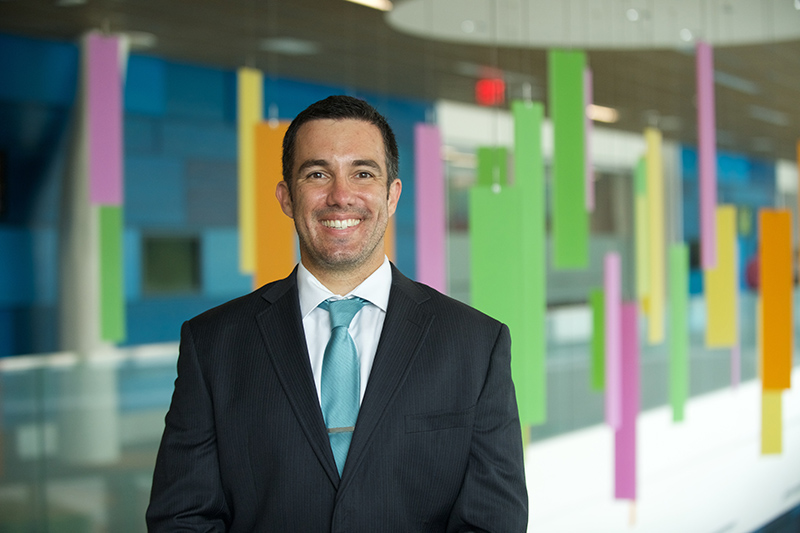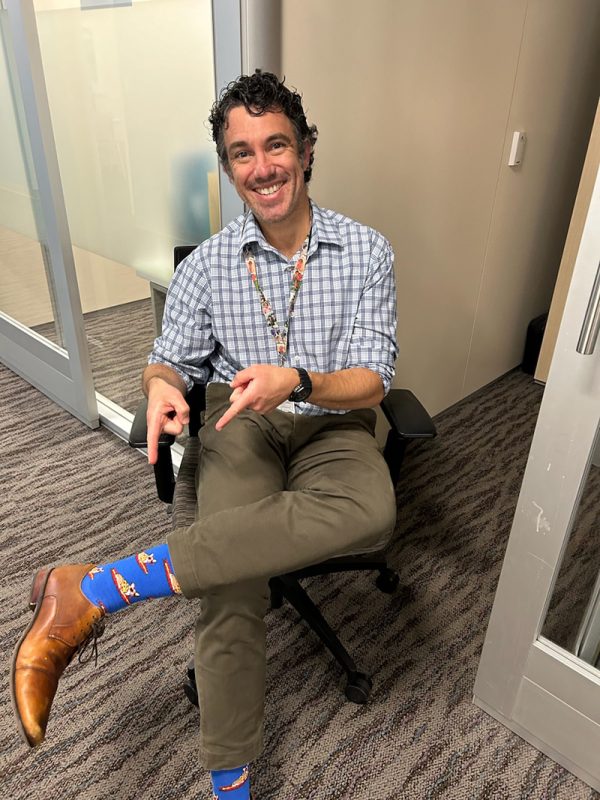
Stephen Steiner, MD, PhD, is a pediatric neurologist at Akron Children’s NeuroDevelopmental Science Center.
As a pediatric neurologist at Akron Children’s NeuroDevelopmental Science Center, Stephen Steiner, MD, PhD, knows that patients and families often arrive nervous for appointments, but his unique approach to family-centered care helps put them at ease. Read the feedback a patient family shared after a recent visit:
“I want to say that the doctor [Dr. Stephen Steiner] was extremely friendly with (patient). He made him feel comfortable. (Patient) normally doesn’t do well with new people, and he made him feel at home. He made him feel safe. He joked around with him. He even gave him a toy. He made my husband and I feel very comfortable. He answered all our questions. I was having doubts in certain areas, and he made me feel like I was such a good mom and the same with my husband. He truly is one of the best doctors that has ever cared for (patient) and that means so much to me.”
Reflecting on this experience and the feedback you received, how do you feel about it?
I’m happy that I was able to provide them with a bit of comfort and understanding. That’s always my goal—to make sure that we’re all on the same page—myself, the patient and their family. I see that as my job. If I can’t get a family to understand or feel like we’re in agreement on a plan moving forward, then I don’t feel like I’ve done my job. It’s good to hear that’s how this family felt.

Dr. Steiner says he wears silly socks to put his patients at ease.
How do you build rapport with patients and families to make them feel safe and comfortable?
In pediatrics, you need to know your audience. It often starts with my choice of socks. I’m not a serious socks kind of guy, so if I can disarm them and make them feel comfortable by wearing something goofy, that’s a good place to start. It can ease the tension. Because let’s face it, no one wants to go see a neurologist if they don’t have to.
As I explain things, I try not to use big words. I try to talk human-to-human, person-to-person. We’re all on level ground. I try not to talk down to patients and families. I also don’t want to tell them what to do or make them feel like they don’t have a choice. I talk to them like I would talk to one of my friends or family members.
What does patient- and family-centered care mean to you? How do you strive to deliver that care?
Family-centered care is representative of pediatrics as a whole and how it differs from other specialties and other branches of medicine. You’re not just treating the child—you’re treating the family.
Kids just want to play. It’s often the parents who are taking on the suffering, the anxiety and the stress of everything. So, while you’re taking care of the child and whatever illness or disorder they may have, the focus is also on the parents. How are they coping? Do they understand what’s going on? What resources are available for their family? That’s how I approach family-centered care.
What do you most enjoy about your work at Akron Children’s?
There are so many things I love about my job at Akron Children’s. I love the team I work with in Neurology. They’re incredible. I feel like we’re a big family, and the respect that I have for them is so great.
My favorite part is joking around and playing with the kids. It’s fun to get to know my patients and their families and to be a part of their care team. I have some patients who I’ve treated for years, and when I finally get them to smile, open up or act silly with me for the first time, that’s a win. Often the reason they come to see me is because of something very stressful, so the little moments of laughter that we share together mean a lot.










